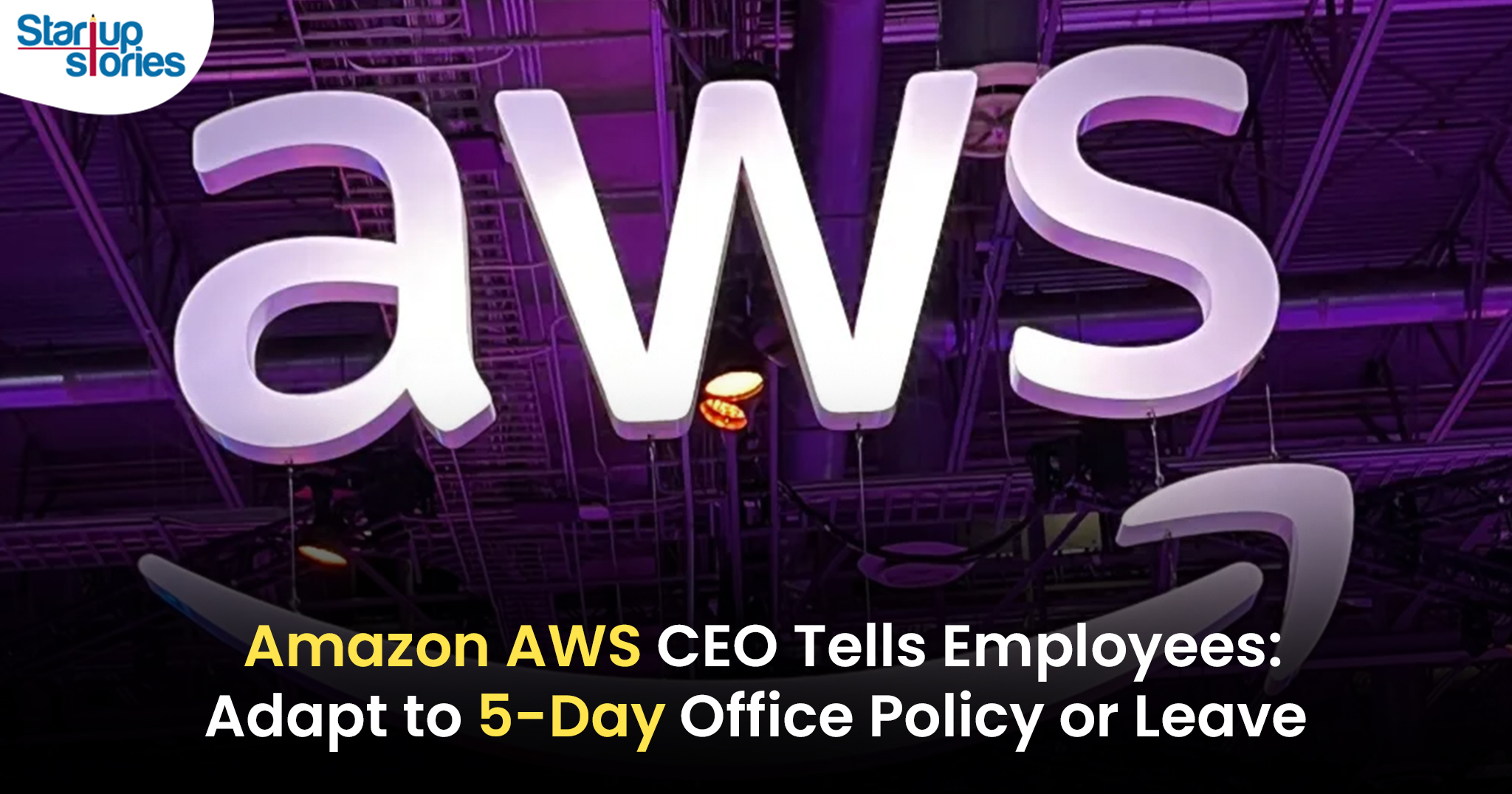News
Employees Who Can’t Work Five Days In-Office Should Consider Quitting, Says Amazon AWS CEO!

Matt Garman, the CEO of Amazon Web Services (AWS), has firmly defended the company’s new policy requiring employees to return to the office five days a week starting in January. During an all-hands meeting, Garman stated that employees unwilling to comply with the full-time office requirement are free to seek employment elsewhere.
“If there are people who just don’t work well in that environment and don’t want to, that’s okay; there are other companies around,” Garman explained. He clarified that this statement was not intended negatively but was meant to foster a collaborative work environment that Amazon prioritizes.
Emphasis on Collaboration and Innovation
Garman elaborated on the struggles the company has faced in terms of innovation and collaboration with remote work arrangements. He noted that the previous three-day office policy was not achieving its intended goals.
“When we want to really innovate on interesting products, I have not seen an ability for us to do that when we’re not in-person,” he remarked.
He highlighted that the staggered in-office days under the three-day policy made it challenging for employees to connect and collaborate effectively. Additionally, he emphasized that Amazon’s leadership principles, which guide the company’s operations, are harder to enforce in a remote setting.
Employee Backlash
The decision to implement a five-day workweek has drawn criticism from many employees, who argue that commuting is inefficient and that the benefits of in-office work lack supporting data. Reports have emerged indicating that some employees who failed to adhere to the three-day policy were considered to be “voluntarily resigning,” resulting in their access to company systems being revoked.
Despite the backlash, Garman remains optimistic about the change, stating:
“I’m actually quite excited about this,” though he recognizes that not everyone shares his enthusiasm.
Comparison with Other Tech Giants
Amazon’s approach to returning to the office is more stringent compared to other tech giants like Google, Meta, and Microsoft, which have adopted more flexible policies requiring employees to work two to three days in the office. CEO Andy Jassy announced last month that the shift to a five-day office schedule is crucial for enhancing collaboration and innovation within the company.
Competitive Landscape
This policy shift comes at a time when many tech companies are reevaluating their remote work strategies post-pandemic. As competition for talent intensifies, companies like Google have implemented hybrid models allowing for greater flexibility. This raises questions about Amazon’s ability to attract and retain top talent amid such contrasting policies.
Employee Sentiment and Future Implications
For those employees who feel they cannot adapt to the new policy, Garman’s message was clear:
“That’s okay; there are other companies around.”
This statement underscores a significant cultural shift within Amazon as it prioritizes in-person collaboration over remote work flexibility. The long-term implications of this policy could reshape employee sentiment and influence recruitment strategies as potential candidates weigh their options in a competitive job market.
Conclusion
As Amazon embarks on this new chapter with its five-day in-office mandate, it faces both internal and external challenges. While Garman emphasizes collaboration and innovation as key drivers for this decision, employee pushback highlights a growing divide between traditional workplace expectations and modern workforce preferences.
The outcome of this policy will likely have lasting effects on Amazon’s corporate culture and its reputation within the tech industry. As employees navigate these changes, only time will tell how this approach will impact productivity, morale, and overall organizational success in an increasingly flexible work environment.
News
Google Launches Startup Hub in Hyderabad to Boost India’s Innovation Ecosystem

Google has launched the Google Startup Hub Hyderabad, a major step in strengthening India’s dynamic startup ecosystem. This new initiative aims to empower entrepreneurs, innovators, and developers by giving them access to Google’s global expertise, mentoring programs, and advanced cloud technology. The hub reflects Google’s mission to fuel India’s digital transformation and promote innovation through the Google for Startups program.
Located in the heart of one of India’s top tech cities, the Google Startup Hub in Hyderabad will host mentorship sessions, training workshops, and networking events designed for early-stage startups. Founders will receive Google Cloud credits, expert guidance in AI, product development, and business scaling, and opportunities to collaborate with Google’s global mentors and investors. This ecosystem aims to help Indian startups grow faster and compete globally.
With Hyderabad already home to tech giants like Google, Microsoft, and Amazon, the launch of the Google Startup Hub Hyderabad further cements the city’s position as a leading innovation and technology hub in India. Backed by a strong talent pool and robust infrastructure, this hub is set to become a growth engine for next-generation startups, driving innovation from India to global markets.
News
BMW’s New Logo Debuts Subtly on the All-Electric iX3: A Modern Evolution

BMW quietly debuted its new logo on the all-electric iX3, marking a significant yet understated shift in the brand’s design direction for 2025. The updated emblem retains the classic roundel and Bavarian blue-and-white colors, but sharp-eyed enthusiasts noticed subtle refinements: the inner chrome ring has been removed, dividing lines between blue and white are gone, and the logo now features a contemporary satin matte black background with slimmer “BMW” lettering. These enhancements showcase BMW’s embrace of modern minimalism while reinforcing their commitment to premium aesthetics and the innovative Neue Klasse philosophy for future electric vehicles.
Unlike rival automakers that reveal dramatic logo changes, BMW’s refresh is evolutionary and respectful of tradition. The new badge ditches decorative chrome and blue borders associated with earlier electric models, resulting in a flatter, more digital-friendly design that mirrors recent branding seen in BMW’s digital communications. Appearing first on the iX3’s nose, steering wheel, and hub caps, this updated identity will gradually be adopted across all BMW models—both electric and combustion—signaling a unified brand language for years to come.
BMW’s strategic logo update represents more than just aesthetic reinvention—it underscores the brand’s dedication to future-ready mobility, design continuity, and a premium EV experience. As the new roundel begins rolling out on upcoming BMW vehicles, it stands as a testament to the automaker’s depth of detail and thoughtful evolution, offering subtle distinction for keen observers and affirming BMW’s iconic status in the ever-changing automotive landscape.
News
iPhone 17 India Price, Features & Availability: All You Need to Know

Apple has officially launched the highly anticipated iPhone 17 series in India, with prices starting at INR 82,900 for the base 256GB model. The new lineup includes the iPhone 17, iPhone 17 Pro, iPhone 17 Pro Max, and the newly introduced ultra-slim iPhone Air. Apple has removed the 128GB storage variant, making 256GB the minimum for all models. The standard iPhone 17 features a vibrant 6.3-inch ProMotion OLED display with a 120Hz refresh rate and an upgraded Ceramic Shield 2 for improved durability. It comes in fresh color options like lavender, mist blue, sage, white, and black.
The iPhone 17 Pro and Pro Max models are powered by Apple’s latest A19 Pro chip and start at INR 1,34,900 and INR 1,49,900, respectively. These Pro models feature sleek titanium frames, significant camera upgrades including 8K video recording, and up to 6x optical zoom in the Pro Max. Meanwhile, the iPhone Air, priced from INR 1,19,900, is the slimmest and lightest iPhone ever, boasting a 6.7-inch Super Retina XDR display with ProMotion technology and a triple-camera setup, positioning itself between the standard and Pro models.
Pre-orders for the iPhone 17 series commence on September 12, with sales beginning on September 19, 2025. Alongside the launch, Apple has reduced prices for the previous iPhone 16 models while discontinuing the iPhone 16 Pro and Pro Max variants. The iPhone 17 series exemplifies Apple’s ongoing commitment to enhancing display technology, camera capabilities, and overall performance, setting a new benchmark for premium smartphones in the Indian market.













Odckvguz
May 25, 2025 at 10:55 am
Explore the ranked best online casinos of 2025. Compare bonuses, game selections, and trustworthiness of top platforms for secure and rewarding gameplaycrypto casino.
u9fmt
June 6, 2025 at 1:36 pm
how to buy clomiphene no prescription clomiphene generic name can i buy generic clomid price where buy generic clomid no prescription buying cheap clomid pill can you get generic clomid without rx clomiphene pct
binance open account
July 1, 2025 at 12:07 pm
I don’t think the title of your article matches the content lol. Just kidding, mainly because I had some doubts after reading the article.
tmgtxkmjs
July 22, 2025 at 9:25 pm
You can email the site owner to let them know you were blocked. Please include what you were doing when this page came up and the Cloudflare Ray ID found at the bottom of this page. Mission Uncrossable is a provably fair game. This means the game is not rigged, and the fairness can be verified. Roobet is an international brand and this means the rules can be different depending on your location. The main difference is typically in the minimum and maximum bets you can place on the Roobet Chicken game, so be sure to check how this applies to your location. You can email the site owner to let them know you were blocked. Please include what you were doing when this page came up and the Cloudflare Ray ID found at the bottom of this page. En Yajuego, te ofrecemos las mejores cuotas y promociones para que maximices tus ganancias. Además, contamos con un equipo de expertos en fútbol sala que te brindarán consejos y análisis para ayudarte a tomar decisiones informadas al momento de apostar. Nuestra plataforma es fácil de usar y te permite realizar tus apuestas de forma rápida y segura.
https://diraga.com/aviator-by-spribe-a-thrilling-online-casino-game-for-tanzanian-players/
The money symbol is represented by different sizes of carps with a number below them. The number represents the amount you get based on your bet. The bigger the fish, the higher the number under it. Values can be 2x, 5x, 10x, 15x, 20x, 25x, 50x, or 2000x of your total bet. You’ll find 12 active paylines within the 5×4 grid of the Bigger Bass Bonanza slot machine. Symbols pay from left to right. Only the highest win is paid per line but when winning on multiple paylines, all active wins are added together to give you a bigger total prize. The base game is about as dry as it gets, so it’s not till free spins trigger that things get interesting. This is done by landing 3, 4, or 5 scatters to win 10, 15, or 20 free spins, respectively. In the base game, when 2 scatters hit, there is a chance another scatter comes onto the screen by a random respin or hook pull feature.
開立binance帳戶
August 20, 2025 at 5:32 pm
Thank you for your sharing. I am worried that I lack creative ideas. It is your article that makes me full of hope. Thank you. But, I have a question, can you help me? https://www.binance.info/en-IN/register-person?ref=UM6SMJM3
binance "oppna konto
October 25, 2025 at 5:48 am
Your point of view caught my eye and was very interesting. Thanks. I have a question for you.
Kuwin
November 5, 2025 at 10:09 pm
kuwin sở hữu kho game đa dạng từ slot đến trò chơi bài đổi thưởng, mang đến cho bạn những giây phút giải trí tuyệt vời.
谷歌站群
November 7, 2025 at 5:02 am
专业构建与管理谷歌站群网络,助力品牌实现全域流量的强势增长。谷歌站群
MM88
November 7, 2025 at 9:58 pm
Khám phá thế giới giải trí trực tuyến đỉnh cao tại MM88, nơi mang đến những trải nghiệm cá cược thể thao và casino sống động.
iwin
November 8, 2025 at 10:51 am
iwin – nền tảng game bài đổi thưởng uy tín, nơi bạn có thể thử vận may và tận hưởng nhiều tựa game hấp
站群程序
November 12, 2025 at 5:54 pm
搭载智能站群程序,自动化搭建与管理,为SEO项目提供核心驱动力。站群程序
MM88
November 13, 2025 at 9:27 am
Với giao diện mượt mà và ưu đãi hấp dẫn, MM88 là lựa chọn lý tưởng cho các tín đồ giải trí trực tuyến.
J88
November 14, 2025 at 5:27 pm
Đến với J88, bạn sẽ được trải nghiệm dịch vụ cá cược chuyên nghiệp cùng hàng ngàn sự kiện khuyến mãi độc quyền.
GO88
November 21, 2025 at 12:14 am
Tham gia cộng đồng game thủ tại Go88 để trải nghiệm các trò chơi bài, poker phổ biến nhất hiện nay.
1win
December 12, 2025 at 1:38 am
https://t.me/be_1win/612
AtomCasino
December 13, 2025 at 6:55 am
https://t.me/s/atom_official_casino
kazino_s_minimalnym_depozitom
December 19, 2025 at 5:29 pm
https://t.me/s/Kazino_s_minimalnym_depozitom
7kCasino
December 29, 2025 at 8:21 am
https://t.me/s/officials_7k_casino
mejor código de referencia de Binance
December 31, 2025 at 9:56 pm
Thank you for your sharing. I am worried that I lack creative ideas. It is your article that makes me full of hope. Thank you. But, I have a question, can you help me? https://www.binance.com/pt-PT/register?ref=KDN7HDOR